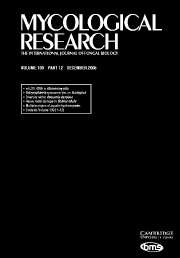Article contents
A nuclease released from Colletotrichum coccodes is not a defence gene elicitor in pea tissue
Published online by Cambridge University Press: 01 February 1998
Abstract
An endo-DNase with single strand nicking activity from the bean pathogen, F. solani f. sp. phaseoli has been previously reported to induce the expression of defence genes in peas. Culture filtrates of the potato pathogen, Colletotrichum coccodes, also contain a single strand nicking endo-DNase (CCN). This nuclease has a molecular weight of ∼27 kDa, an isoelectric point of pH 7·8, optimal catalytic activity at pH 5–6 and is stable at temperatures below 50°C. CCN activity increases are observed with addition of cation cofactors, favouring Mn2+>Co2+>Ca2+> Na+>Zn2+. CCN is inhibited by aurintricarboxylic acid, a nuclease inhibitor. The point of CCN cleavage on the DNA molecule is between the 5′-phosphate and the 3′-hydroxyl. CCN also possesses RNase activity. Although the C. coccodes culture filtrate can induce the expression of disease resistance response genes and phytoalexin production in pea tisue, this inductive activity does not co-purify with the CCN DNase activity through the Sephacel G-75 purification step, and thus CCN applied singly does not serve as a signal for initiating the host defence reponses. Because CCN degrades both DNA and RNA, it is more probably a nutrient scavenging enzyme.
- Type
- Research Article
- Information
- Copyright
- The British Mycological Society 1998
- 6
- Cited by




